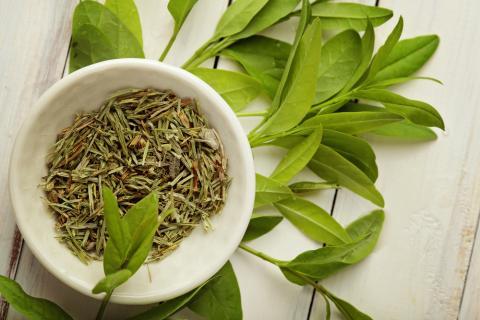
If you find yourself having trouble getting out of bed in the morning without a cup of joe, it might be time to try a new way to get that caffeine fix. There are natural ways to get caffeine that are jam-packed with lots of antioxidants without resorting to coffee. These ways are even better for your health than gulping down that cup—or five cups—of coffee.
Yerba Mate
This South American drink combines the benefits of two great things—coffee and tea. It has all the regular health benefits of tea, including over 20 vitamins and minerals and plenty of antioxidants. It also has the brain boost of chocolate, which makes it a great option to get the caffeine you crave. Yerba mate also helps with digestion—putting its benefits well over coffee.
You may also see a boost to your immune system after drinking yerba mate. That's because it's high in compounds called saponins that can help seasonal allergies, inflammatory bowel disease, multiple sclerosis, diabetes, and rheumatoid arthritis.
Green Tea
Loose-leaf green tea is another excellent option to get caffeine without coffee. It has about one-third of the amount of caffeine compared to one cup of coffee, but it packs so many other benefits you won't even notice. Preliminary research on the flavonoids in green tea shows that they may help reduce the risk of cancer. It also has amino acids that help give you the kick you need from a cup of coffee, but also produce strong anti-anxiety effects that will keep you calm.
Studies suggest that green tea also boosts your metabolism and lowers your body fat. This is in stark contrast to coffee which studies show increases your risk of heart disease if you drink more than two cups a day. Plus, it’ll give you a talking point in the office when people ask why you’re drinking tea instead of your usual cup of coffee.
Kombucha
Give kombucha a try if you need something strong in the mornings. This fermented tea has a sweet and sour flavor with mild caffeine content. It's not just good for getting caffeine—the probiotic cultures in kombucha help your digestive system. Regular drinkers say they feel more energetic in the mornings after they drink it.
The switch to kombucha could also help your teeth. Coffee creates acids that cause enamel and tooth erosion and lead to brittle and thin teeth. While kombucha is also acidic, waiting 30 minutes to eat after drinking kombucha will allow your tooth enamel to harden and protect it from decay.
Chocolate
Chocolate may not have the same amount of caffeine as a cup of coffee, but it’s the perfect afternoon pick-me-up. About ten squares of dark chocolate equal the same amount of caffeine that's in one cup of coffee. However, you can satisfy your sweet tooth while you get some caffeine and some powerful antioxidants by eating a square of chocolate in the afternoon.
Try to stick to dark chocolate since it provides the most health benefits. It can improve your blood flow, lower your blood pressure, reduce your risk of heart disease, and improve brain function. All in moderation though.
Exercise
Resist that urge to snooze your 6 a.m. gym alarm because it may make you less tired. Regularly exercising leads to higher amounts of energy and less need for excessive amounts of coffee. Low-intensity exercises for just 20 minutes several times a week increased energy levels in one study.
The more intense your exercise, the more benefits you get. The effects are often immediate and short-term though, so try to sneak in a workout when you need the most energy. Maybe that's first thing in the morning before work, or perhaps it's over your lunch break.
It’s okay to have a cup of coffee now and then. It’s also okay if you can’t quit cold turkey and need to spend some time figuring out which natural caffeine remedy is right for you. Once you find it, you can start to get the caffeine you need with more health benefits to go with it.








